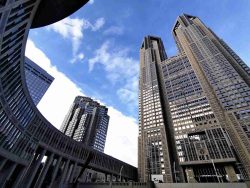12:59 JST, May 26, 2021
Expectations are growing for hydrogen energy, to realize decarbonization with the aim of not emitting greenhouse gases. The public and private sectors need to work together to overcome a mountain of challenges for that purpose.
In mid-May, the Economy, Trade and Industry Ministry announced a plan to invest a total of ¥370 billion in private projects to promote the usage of hydrogen. The ministry plans to use a ¥2 trillion fund established by the government to support technological innovation for decarbonization.
The ministry has started accepting applications for such projects as the establishment of hydrogen supply networks, the practical use of thermal power generation with hydrogen as its fuel, and the scaling-up of hydrogen-producing equipment in Japan.
Hydrogen does not emit carbon dioxide when it is burned, simply turning into water. It is already used in fuel cell vehicles (FCVs) and for other purposes, but if it can be used for large-scale thermal power generation, that would significantly reduce CO2 emissions.
Japan’s hydrogen-related technology is believed to be at the highest level in the world. It is vital to promote such technology through the fund, and accelerate the pace of research and development.
The government has set a goal of reducing greenhouse gas emissions to virtually zero by 2050, positioning hydrogen utilization as one of the major options.
But the cost is relatively high at the moment. Hydrogen power generation is said to cost about ¥97 per kilowatt hour, seven times more than thermal power generation with liquefied natural gas.
Major electric power companies have started to mix hydrogen with LNG for use as fuel for thermal power generation on a trial basis. They intend to gradually increase the proportion of hydrogen. It is important to reduce costs by expanding the utilization of hydrogen.
To reduce the cost of procuring hydrogen, it is realistic to import hydrogen from overseas. This is because it can be extracted from cheap lignite coal, which is abundant in Australia and other countries.
Kawasaki Heavy Industries Ltd. and other companies plan to build the world’s first special ship to carry liquefied hydrogen and start a feasibility test to transport hydrogen produced in Australia to Japan.
Liquefied hydrogen must be cooled to minus 253 C or lower for transport. Therefore, it is important to improve transportation and storage technologies.
Japan has limited natural resources, and if hydrogen can be produced domestically by the electrolysis of water, apart from liquefied hydrogen, that would contribute to the nation’s energy security. This will require electricity generated by solar and wind power for the electrolysis.
In the spring of last year, one of the world’s largest facilities for producing hydrogen from electricity generated by solar power started operating in the town of Namie, Fukushima Prefecture. It supplies hydrogen for use in FCVs and for other purposes.
However, the cost of power generation by solar and other renewable energies in Japan is higher than in other countries, and thereby the cost of producing hydrogen is also relatively high. It is necessary to consider the expansion of domestic hydrogen production in terms of energy policy as a whole, including efforts to reduce electricity costs.
— The original Japanese article appeared in The Yomiuri Shimbun on May 26, 2021.
Top Articles in Editorial & Columns
-

Riku-Ryu Pair Wins Gold Medal: Their Strong Bond Leads to Major Comeback Victory
-

Reciprocal Tariffs Ruled Illegal: Judiciary Would Not Tolerate President’s High-Handed Approach
-

China Provoked Takaichi into Risky Move of Dissolving House of Representatives, But It’s a Gamble She Just Might Win
-

Japan’s Plan for Investment in U.S.: Aim for Mutual Development by Ensuring Profitability
-

Flu Cases Surging Again: Infection Can Also Be Prevented by Humidifying Indoor Spaces
JN ACCESS RANKING
-

Producer Behind Pop Group XG Arrested for Cocaine Possession
-

Japan PM Takaichi’s Cabinet Resigns en Masse
-

Man Infected with Measles Reportedly Dined at Restaurant in Tokyo Station
-

Israeli Ambassador to Japan Speaks about Japan’s Role in the Reconstruction of Gaza
-

Videos Plagiarized, Reposted with False Subtitles Claiming ‘Ryukyu Belongs to China’; Anti-China False Information Also Posted in Japan




















